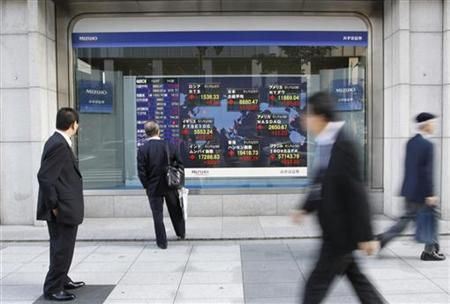Berlusconi Pledge to Quit Lifts Global Stocks

Political changes at the top of two of the euro zone's most troublesome economies boosted world stocks Wednesday as investors bet that new brooms may help ease the currency bloc's debt crisis.
Italian Prime Minister Silvio Berlusconi said late Tuesday that he would step down after parliament passes budget reforms. Greece, meanwhile, was struggling to create a consensus government under a new prime minister.
Although Berlusconi's pledge to resign may lead to a period of political uncertainty in the euro zone's third largest economy, his often controversial presence at the top has been viewed by many in the markets as a block to fiscal reform.
In Greece, a government spokesman said a new coalition would be announced later in the day, although there was no indication of a deal on a new prime minister to lead the country back from the brink of bankruptcy.
World stocks as measured by MSCI were up more than a quarter of a percent, while in Europe the FTSEurofirst 300 <.FTEU3> rose around 0.9 percent.
Although there's still a lack of clarity as to precisely how the next (Italian) leadership will be formed, investors are clearly encouraged by the fact there will now be change at the top and for the time being at least, this is bringing the bulls back into play, said Terry Pratt, trader at IG Markets.
Earlier, in Japan, the Nikkei average <.N225> closed up nearly 1.2 percent on optimism about Italy, which is also the world's third largest debt market.
Shares of camera maker Olympus <7733.T> fell 20 percent. On Tuesday, the scandal-hit firm said for the first time that contentious acquisitions helped it cover losses on securities investments dating back to the 1980s.
DEBT PRESSURE
Berlusconi's pledge to go did little to ease the pressure on the country's debt.
Yield's on 10-year Italian bonds were slightly higher, above 6.7 percent and heading toward the 7 percent level that is generally viewed as unsustainable.
Core German debt was also weaker as investors favored stocks.
(German) markets will be down, obviously, but we'll see what the alternatives (to Berlusconi) are, one trader said.
The euro, beset by the region's two-year debt crisis, rose 0.2 percent against the Swiss franc, where there were concerns about central bank intervention.
But it shed 0.1 percent to $1.3762, down from $1.3773 late in New York and well off a 2-month high of $1.4248 hit on October 27.
(Additional reporting by Marius Zaharia and Atul Prakash; editing by Anna Willard)
© Copyright Thomson Reuters 2024. All rights reserved.




















